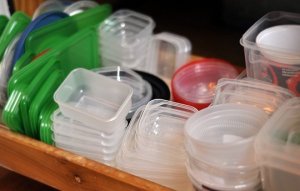My Good Tupperware
Eddy’s mother and her plastic covered sofas was a situation similar to what my mother referred to as her “Good Tupperware;” Good Tupperware being the stuff which one uses only on special occasions. How one determines what is a special occasion for special used food containers or what makes the food containers so special is beyond me.
There were always other things around the house that were “good” varieties of something that could not be used every day, such as for example towels, plates, glasses, linens or silver ware. The general idea is that all these things should always be and should always stay in new or relatively new condition, but not be worn out by ordinary family members in ordinary day-to-day use. They have to be on standby alert and ready for mobilization “just in case.” Just in case someone comes over. Just in case it’s needed it for a party.
The most extreme example of non-use is the Italian household dining room, perpetually roped off by Funeral Parlor style gold stanchions and velvet ropes. The only thing missing is a sign stating “This Room is Open Only on Christmas Day; between the hours of 1 to 3 p.m.”
Once in awhile, if I went to my parent’s house for dinner, I would take some food home in a Tupperware container, wash it, throw it into a cabinet and then forget about it. Every time I left their house with something in one of those containers, my mother would say: “Now don’t forget, that’s my Good Tupperware.”
She never said: “Bring it back.” I guess that was implied. I also never understood why she never gave me take-home food in her bad Tupperware, which by secondary implication should be expendable or disposable.
Then out of nowhere, at some distant time in the future, she would say:
- I think you still have that piece of my good Tupperware.
Why she needed it then was anybody’s guess, and because she and my father had not entertained at home in years there was always a veiled inference that I was trying to steal it from her. Once when I was finally irritated to extremis by the implications, I said to her:
- You have the key to my house. You know when I am at work during the day. Go over and take anything that is yours and anything else you think might belong to you. I have two of everything anyway.
- Yes. Because half of all of it is really mine.
My ex-Sister in law, Patty, once won radio contest tickets to an Eric Clapton concert, which included front row seats along with the additional prize of a Clapton autographed Fender Electric Guitar.She kept the guitar in a case where no one is ever allowed to see it much less to ever touch it and although her daughter, my niece Kendall, wanted to take guitar lessons, Kendall was not allowed to try it out it to see if she did indeed have any real interest. You see, although the mother who owns this prized valuable guitar cannot play it either, she also paradoxically does not have any desire whatsoever to learn how herself. Then after she and my brother separated she could not afford to buy another one either, so the financial burden of the child’s cultural future shifted over to the dad, who had to buy a new practice guitar for their daughter.
Given the circumstances, the logical thing to do would either be to sell it, to use it, or to donate it to the Rock and Roll Museum in Cleveland. Also because Patty knows nothing about safe instrument storage, perhaps she should at least make sure that how she stores it has not ruined or rendered the instrument useless; thus making it the Miss Havisham of fine guitars.
In our materialistic society it is often the case that too much emphasis is placed on things while not enough emphasis is placed on people. There are too many plastic covered sofas that never get ordinary wear, too much covetousness for things that are owned, saved or overly cherished like little trophies hidden away in the nondescript little glass case in the corner of the living room.
Most people are more likely to be lividly outraged that their car was damaged in an accident than to worry about whether the person in the other vehicle was hurt.
It is also very likely that many people actually inherit a lot of their “good stuff” and then re-store it in their homes where it becomes reclassified as an “heirloom,” only to once again never to be used for any practical purpose. We often lose sight of the important perspective that while all of our “things” can eventually always be replaced, the broken, damaged and lost people in our lives cannot.
In the long run it would have been better if my mother and Patty had left their prized possessions with me, because I would have been sure to place them in their coffins, like an Egyptian Pharaoh with all his necessary accoutrements, ensuring them both a safe, happy astral trip to the afterlife with a guaranteed seat at the table next to Orion. So who says you can’t take it with you?
Good Tupperware. Like a closet full of things too good to put out for the family but saved rather for the party that never happens. The stuff that gets stored for the all those other special occasions that never happen, or put aside for the guests who just never seem to ever come over.
Heard melodies are sweet, but those unheard are sweeter,
Therefore, ye soft pipes, play on.
(Keats)
Photo source: http://www.kitchn.com
